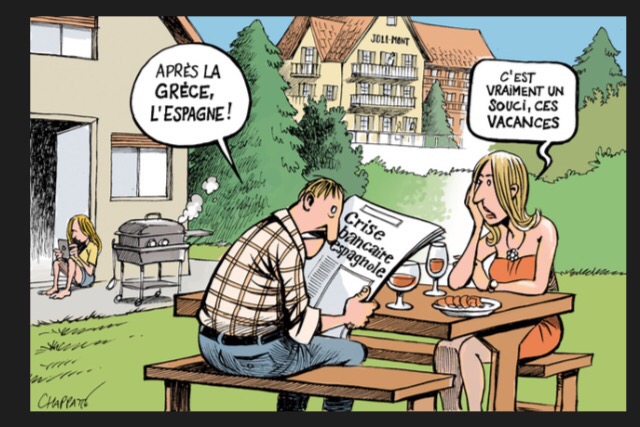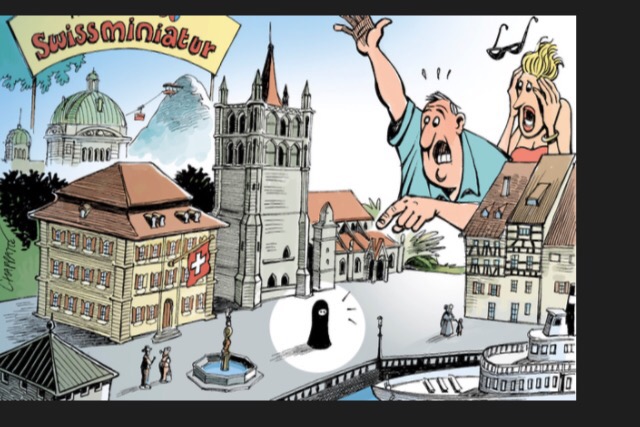Ali- We are now over a week out from the American Presidential election and I would like to offer a reflection from abroad, giving you a small glimpse into the perspective of the Swiss (based on, admittedly, a small sample). In contrast to Joe’s early morning anguished post that demonstrated his political affiliation, emotional state and level of sleep deprivation, I’m going to try to remain fairly neutral on the topic out of sensitivity to the random conservative who accidentally happens on our blog while trying to get to www.swissfantasyabraham.com, the Swiss Jewish erotica site (ok I made that up but I bet you just googled it).
My first Swiss contact on the day after the election was with one of my 4 regular officemates, Marco. Marco is an epidemiology doctoral student at the Institute for Epidemiology, Biostatistics and Prevention at the University of Zurich. After the usual morning greetings he said he felt very bad for me and our other American officemate, Sarah. I didn’t ask him to expand on his sympathetic impulses towards his American coworkers but this was my first sense of what became the main theme of my Swiss encounters that week: pity. Next was another doctoral student who asked me, “How are you doing?” in the same way one would ask a person after a death in the family. Next was Milo, my colleague and boss here in Zurich, the director of the Institute and a guy who spent 5 or so years in Baltimore at Hopkins. He was both sympathetic and sanguine, assuring me that the president-elect really has very little ability to make major changes and will most certainly moderate.
Later in the week, I went out to lunch with one of the academic staff, Evelyn, who has lived her whole life in Switzerland. She expressed pity combined with utter disbelief. I found myself explaining the “working man’s plight”, basically regurgitating all the post election analysis about the angry masses who have seen their lot in life decline while watching the rising yachts of the American elite. The fact that this was all a fairly novel insight for her speaks a bit to the unimaginable reality of America for Europeans, who are citizens of countries with strong social safety nets, free or subsizided college, and high standards of living. The fact that we have a bit of a third world country nestled within America – the citizens of which are poorly educated, unemployed, uninsured and have zero access to opportunity – is foreign in all senses of the word to your average Swiss citizen. Remember this is the country that recently voted on a country wide unconditional minimum income of around $30,000!! Ok it failed but still the fact that this idea was main stream enough to get a vote tells you something about how the Swiss feel about the social safety net and government’s role in taking care of vulnerable citizens.
My most recent Swiss encounter over the election came when our administrator, Maja, returned from vacation in Egypt. She told me the Egyptian people were surprised and worried over the American election, which I found striking as the Egyptian leadership isn’t exactly the pinnacle of individual liberty and benevolence. So the fact that Egyptians were saying, “wow, what have those Americans done with their government?” was slightly disconcerting. You’ll never guess what sentiment Maja expressed. Yea….pity.
Now I should maybe also give you the expat take. There are boatloads of english speaking expats here: Australians, Brits and Americans. I got a nice text on Wednesday after the election from a British friend asking if I was in need of a girls night. The American expats – and bear in mind that an American living abroad is probably someone highly educated and well off – were generally devastated. There were tears and frustration, lots of anger and some defiance, e.g. the American who told me she will donate whatever large sums of money she needs to to avoid paying a dime in US tax because there was no way she was supporting the US government now.
Now given that pity was the main sentiment with sprinklings of surprise, mild superiority and classic Swiss emotional reserve (admittedly in a small probably non-representative sample), I would also like to enlighten folk as to how the Swiss do government. The extent of American knowledge and regard for how other countries do things is generally summed up by, “There’s the American way and then there’s the ….errrrr…. America’s the best!”, which affirms our abiding pride in our intentional ignorance. So feel free to skip the rest and go to our post about leprechauns in Ireland if you would like to comfortably maintain your certainty in American exceptionalism.
Unlike the US, which is a representative democracy, Switzerland is a direct democracy, which means all of the 5.3 million eligible citizens directly vote on members of Parliament as well as any referendums, which are held up to 4 times a year when laws are disputed. Parliament is composed of two bodies: the National Council, which represents the population and the Council of States, which represents the Cantons (i.e. States and there are 26 of them). Parliment then elects members of the Executive branch, the Judiciary branch and the Attorney General. The Executive Branch, which is in charge of implementing laws that are passed by Parliment, is composed of 7 Federal Councillors and one Federal Chancellor. The Chancellorship rotates between the Councillors and Councillors serve 4 year terms but can be re-elected by Parliment. Now the Swiss informational brochure on their government brags that, “the people have more say on how their country is run than in almost any other country in the world.” My American ignorance prevents me from commenting on that but indeed Switzerland is a lot like California in allowing the general population to have a say on laws. This can be a great thing, like recent approval of Proposition 63, which implemented background checks on ammunition purchases, or a terrible thing like Proposition 8, where the California populace rolled back rights for a minority subset.
There are a couple other details that do a lot to shape the governmental bodies of Switzerland. First, there are 12 political parties and seats in the National Council are dolled out proportionately according to the percentage of the vote. So this means that even small parties are likely to gain a seat or two and be represented. Also Parliment is semi-professional, meaning that members also hold down regular jobs, which keeps them tied into the community and assures that no one gets too invested in their political office.
So depending upon how that all sounds to you, it may or may not explain the pity and slight air of political smugness. Now it’s not all sunshine and chocolate fondue here. Switzerland refuses to join the European Union, instead trying to get all the benefit without taking any of the pain. In 2014, the Swiss voted to restrict immigration in an echo of global nationalistic impulses. And even in Switzerland, political cartoonists thrive, pointing out the absurdities. Here’s a couple of my favorites: May 2012. The crisis in southern Europe viewed from Switzerland. Newspaper headline: “Spanish banking crisis”. “First Greece, and now Spain!” “Our next holidays are a real worry,” So this is a dig at the Swiss people, who are only affected by the crisis as it impacts their holiday plans.
May 2012. The crisis in southern Europe viewed from Switzerland. Newspaper headline: “Spanish banking crisis”. “First Greece, and now Spain!” “Our next holidays are a real worry,” So this is a dig at the Swiss people, who are only affected by the crisis as it impacts their holiday plans.  September 29, 2013. Canton Ticino, where SwissMiniatur model park is located, bans burkas. And this is a dig at the nativist anti-immigrant tendencies that have arisen particularly in the countryside…. Sound familiar?
September 29, 2013. Canton Ticino, where SwissMiniatur model park is located, bans burkas. And this is a dig at the nativist anti-immigrant tendencies that have arisen particularly in the countryside…. Sound familiar?
Ok I’ll end with a Chinese parable that I read in one of Maya’s books and I’ve always found it quite comforting when things don’t go the way I’d hoped.
One day in late summer, an old farmer was working in his field with his old sick horse. The farmer felt compassion for the horse and desired to lift its burden. So he left his horse loose to go the mountains and live out the rest of its life.
Soon after, neighbors from the nearby village visited, offering their condolences and said, “What a shame. Now your only horse is gone. How unfortunate you are! You must be very sad. How will you live, work the land, and prosper?” The farmer replied: “Who knows? We shall see”.
Two days later the old horse came back now rejuvenated after meandering in the mountainsides while eating the wild grasses. He came back with twelve new younger and healthy horses which followed the old horse into the corral.
Word got out in the village of the old farmer’s good fortune and it wasn’t long before people stopped by to congratulate the farmer on his good luck. “How fortunate you are!” they exclaimed. You must be very happy!” Again, the farmer softly said, “Who knows? We shall see.”
At daybreak on the next morning, the farmer’s only son set off to attempt to train the new wild horses, but the farmer’s son was thrown to the ground and broke his leg. One by one villagers arrived during the day to bemoan the farmer’s latest misfortune. “Oh, what a tragedy! Your son won’t be able to help you farm with a broken leg. You’ll have to do all the work yourself, How will you survive? You must be very sad”. they said. Calmly going about his usual business the farmer answered, “Who knows? We shall see”
Several days later a war broke out. The Emperor’s men arrived in the village demanding that young men come with them to be conscripted into the Emperor’s army. As it happened the farmer’s son was deemed unfit because of his broken leg. “What very good fortune you have!!” the villagers exclaimed as their own young sons were marched away. “You must be very happy.” “Who knows? We shall see!”, replied the old farmer as he headed off to work his field alone.
As time went on the broken leg healed but the son was left with a slight limp. Again the neighbors came to pay their condolences. “Oh what bad luck. Too bad for you”! But the old farmer simply replied; “Who knows? We shall see.”
As it turned out the other young village boys had died in the war and the old farmer and his son were the only able bodied men capable of working the village lands. The old farmer became wealthy and was very generous to the villagers. They said: “Oh how fortunate we are, you must be very happy”, to which the old farmer replied, “Who knows? We shall see!”